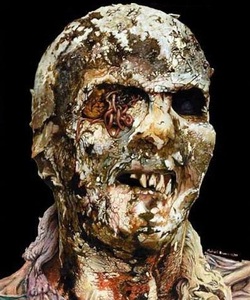
The original Alien movie was all about man’s complex relationship with nature. The titular monster would smother its victims, lay an egg inside them and then burst out as a rampaging xenomorph (and he doesn’t even buy you dinner ). The embryonic stage plays with fears of rape and disease. As a xenomorph, the creature is a metaphor for the relentless, destructive power of nature. It is the answer to every fear about what lurks beneath the surface of a dark sea; a raging, unstoppable beast that answers only to the logic of its own appetites. It cannot be reasoned with.
Crucially, Alien and its sequels didn’t state any of these ideas openly. The 1979 movie works on the level of the id. The interior of the humans’ spaceship is soft with undulating lights, like a womb. The craft in which the monster is discovered has the smooth, black rubbery interior of a bondage workshop. The creature does its dirty work with a penile appendage, and the xenomorph’s head is phallic. The reason why Alien stays inside your head for so long is that its images are unsullied by explanatory dialogue, which would reduce fear to theory. It’s a nightmare made flesh.
The problem with Prometheus is that it approaches its issues literally and unimaginatively. Of course, there are a lot of other problems, too. The acting is variable (Noomi Rapace accent wanders from Scotland to Wales, via Long John Silver) and the stand out performance by Michael Fassbender is undermined by his character’s decapitation. The movie loses all gravitas when Fassbender’s head rolls around the floor chatting away in his creepy camp monotone. The plot is unoriginal (a mix of Leviathan and Quatermass and the Pit) and everyone’s motivations change halfway through (when everyone stops to have sex). The heroes are supposed to be archaeologists, but their approach to their craft is more akin to demolition experts. All the characters are dumb. Where would you choose to spend the night when trapped in an alien spaceship? Somewhere near the exit or camped out in a room full of oozing black liquid? Worst of all, it’s unscary. When a flapping, gooey monster is plucked from Noomi’s belly, my theatre companion shouted out “Who ordered the calamari?” Seriously, there’s about five minutes of gore in this “horror” movie.
But the most annoying thing is the way that the movie signposts its themes. The big one is the relationship between parents and children. The movie opens with the ultimate generative act: an alien “engineer” dissolves himself into the waters of the young Earth to create the primordial soup from which we evolved. Flash forward and the humans go in search of their parents … only to discover that mommy and daddy want to wipe them out by returning to Earth with a cargo of alien DNA. Meanwhile, the head of Weyland industries has two children – a daughter that he seems to despise and an android who is devoted to him (although the android later suggests that he’d like to kill his father; Sigmund Freud, they’re playing our song). Noomi Rapace can’t have a baby but gets impregnated with alien DNA and ends up birthing a jellyfish, which she does her best to kill. The only person in the movie without daddy issues is the wisecracking, cigar smoking black pilot. He’s too busy being a cliché.
There’s nothing wrong with a touch of metaphor, but Ridley is so obsessed with showing us how clever he is that these allusions crowd out the plot and might be why the movie grinds to a halt halfway through (something many reviewers have spotted). Whereas Alien was a tight, taught little movie with sparse dialogue that let images speak for themselves, Prometheus is so in love with its own epicness that it forgets to tell a story. It’s Ben Hur without the chariot race. Prometheus even comes with a soaring strings soundtrack that (while very good) undermines all the onscreen tension. It’s hard to be frightened about the descent into the bowels of an alien craft when the journey is accompanied by the theme tune to Gone With the Wind.
All of this might have been forgivable if there were some interesting answers to the questions that Prometheus throws up. But there aren’t. The engineers who created us are, despite their high technology, roaring beasts of the living dead variety. There may or may not be a God; life may or may not be worth living. Nihilism rules everything: children want to kill parents, parents want to kill children. The movie has no moral centre or voice of responsibility, only a constant search for knowledge. It's an episode of Star Trek, written by Richard Dawkins.

 RSS Feed
RSS Feed